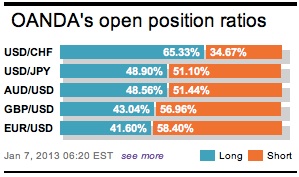Historically, the Monday after a newly minted US unemployment report tends to end up being the least volatile trading day of the month. Last Friday’s December release was in hindsight ‘relatively’ strong, managing to touch market consensus. However, in the midst of the FOMC minutes produced 24-hours earlier, many facets of the market are relieved that the number was “not too strong as to make early normalization a serious prospect.” Some analysts expect the Fed to scale back their asset purchase program towards the year-end of this year. The overall monetary and macro policy landscape currently supports the risk-on environment, however, investors can be expected to be more selective in identify those ‘risk currency’s.’ Perhaps positioning and policy expectations are a good enough reason why the ‘single unit’ or EUR is underperforming?
Ahead this week, the ECB meet will be a key focus. There is a slim possibility that policy makers elect to cut the repo rate, following up on the dovish comments and weak growth forecasts delivered at last month’s press conference. However, recent data flow and current financial market stability makes a shift in policy this week difficult to digest. Greater scrutiny will be on President Draghi, who is likely to continue to emphasize risks to growth and his willingness to ease, most likely downplaying the significance of recent upside surprises. He can also be expected to face furthering questioning on negative interest rates and OMT activation. Both of these policies are expected to be EUR negative.
The USD/JPY bandwagon so far has been consistent, however, seller or buyer beware. The pair has taken flight over the past three months for good reason, but are they a good enough reason? First, yen has fallen on tougher times due to the expectations of a more aggressive monetary policy; a Shinzo Abe political promise. Abe has called on the BoJ to tackle deflation by raising its inflation target. No matter what, Governor Shirakawa does not retire until April and he will not want to be manhandled before departing. Second, the hope that with the US recovery underway, may lead to the possibility that the Fed may not be wholly committed to extending QE purchases has been supporting the ‘big dollar’ outright to yen. Finally, as global risk sentiment became less of an issue, dollar and yen rate differentials has being favoring the greenback.

The major problem with this trade is that too many investors have it on. The pair has managed to print a 29-month high after rallying +14.4% over the past three months. Market participants cannot be too hasty in casting yen further adrift. Why? Aggressive Japanese policy easing is still not assured (remember, the BoJ has been easing policy for sometime). What if the US fiscal deal leads to the slowing down of global economies? This will certainly encourage Bernanke to look towards an easing policy again. The fiscal deal already struck is expected to inject some economic uncertainty and even undermine the US recovery. Finally, global risk sentiment changes with the wind. The declining of global tensions is making the yen unattractive. Optimism over the Euro-zone debt crisis may be misplaced. Euro-politicians still struggle to produce a sustainable solution. For now, it’s just not news worthy enough. These are good enough reasons not to marry this one directional trade with gusto!

The EUR will be vulnerable if the ECB stays dovish. Expectations of aggressively expressing this belief have died down over the past few weeks, mostly due to the recent euro-economic data. There is a slim outside chance of a rate cut this week, however, ECB policy makers are expected to instead continue to send a dovish message. Technical analysts state that day trend indicators are tending to ignore oversold levels and head south in spite of the positive close last week. They are looking for further weakness and expect to stick to selling the single unit on rallies, targeting 1.2960-65 level.

Other Links:
Yen Depreciation Continues as Abe Returns
This article is for general information purposes only. It is not investment advice or a solution to buy or sell securities. Opinions are the authors; not necessarily that of OANDA Corporation or any of its affiliates, subsidiaries, officers or directors. Leveraged trading is high risk and not suitable for all. You could lose all of your deposited funds.



